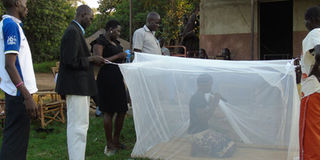Apac hit with high malaria cases

Sample. Health officials demonstrate to the community members how to safely use a mosquito net following a Malaria outbreak in Gulu in 2016. Residents of Apac District have been advised to sleep inside insecticide treated nets following an upsurge of Malaria cases in the district. PHOTO BY JAMES OWICH
Residents of Apac District have been advised to sleep inside insecticide treated mosquito nets following rampant malaria cases in the district.
Apac started experiencing the upsurge in malaria transmission towards the end of May this year when mosquito breeding shot up following a downpour, according to authorities.
Currently, outpatient departments in various health units are reportedly crowded with long queues of patients seeking malaria treatment. There are a total of 18 health centres in Apac.
The District Health Officer (DHO), Dr Mathew Emer, confirmed the upsurge in malaria cases in Apac on Wednesday.
He said about 80 of 100 suspected cases being registered at some health facilities are those suffering from malaria.
“In some facilities, of 100 people you suspect to be having malaria, you find 70 or 80 of them confirmed to be having the disease,” Dr Emer said.
Treatment
So, those presented with symptoms such as headache, cold and fever are now advised to immediately seek the assistance of the Village Health Teams (VHTs) before their health deteriorates.
“In the event that the trained VHTs cannot handle the case, then they will refer you to the nearest health facility for proper management,” he said.
Dr Emer further appealed to the community to use their nets religiously.
He said in households with inadequate nets, priority should be given to children and pregnant mothers.
Residents are also encouraged to close their windows and doors early because the mosquitoes tend to enter late in the evening, at around 5pm.
“And if somebody feels unwell, the VHTs are there to offer support,” he said, adding that malaria rapid diagnostic tests and Coartem (anti-malarial) are still accessible at the community level.
However, the only challenge now is that most health facilities are stocking out of essential medicine, especially the drugs used in the first line treatment.
“But we have made an emergency supply order [with the National Medical Stores]. We are maintaining the facilities by redistributing the ones which have more. That is how we are still surviving now. But before the end of this week, we should be having the supplies delivered,” Dr Emer added.
The start
Dr Emer said Apac started experiencing the upsurge of malaria cases since May this year.
“Although we have been following our normal channel in the month of May, it has just crossed now the alert line,” Dr Emer said.
However, he said there is no cause for alarm.
“We cannot say we have an epidemic because it has just crossed our alert line and we are responding,” he said.
Health experts said accurate, well-validated systems to predict unusual increases in malaria cases are needed to enable timely action by public health officials to control such epidemics and mitigate their impact on human health.
“Such systems are particularly needed in epidemic-prone regions such as the East African highlands,” Dr Dawit Teklehaimanot, a medical director and zonal malaria control programme officer in Ethiopia, said in his research report.
“In such places, transmission is typically highly seasonal, with considerable variation from year to year, and immunity in the population is often incomplete. Consequently, epidemics, when they occur, often cause high illness and death rates, even in adults,” he added.
Malaria prevalence in Apac
Located in northern Uganda, Apac is surrounded by water bodies, including Lake Kyoga and two big swamps known as Arocha and Wiriwiri.
According to the etymological infective rate (EIR) conducted in 2004, the district was found to have the highest number of mosquito bites in the world standing at 1,564 bites.
Dr Myers Lugemwa, the deputy manager of malaria control programme in the Ministry of Health, said when 1,564 is divided by the number of days in a year, an individual living in the district suffers about five mosquito bites every night.



